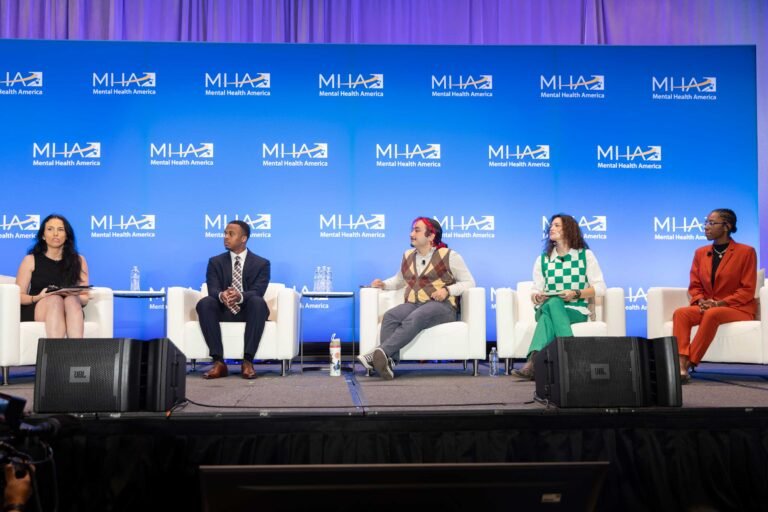Mental Health America held its second day of keynote events at its 2024 Mental Health America conference on Friday, kicking off with music and conversation with Me2/ Orchestrathe world’s only classical music organization created for people with mental illness and the people who support them. The presentation was sponsored by Neurocrine Biosciences, Inc.
Following the performance and panel discussion, four of Mental Health America’s Young Mental Health Leaders, Makaila Davis, Anastasia Erley, Jonathan Jean Charles, and Kaisar Perry took center stage, along with Vice President of Youth and Peer Advocacy, Kelly Davis. The group discussed what is missing from current approaches to mental health and the importance of intergenerational collaboration that provides two-way guidance and authentic relationships.
“To me, intergenerational collaboration means combining the wisdom of older generations with the fresh ideas of younger ones to create more sustainable solutions in mental health,” said Makaila Davis.
Jonathan Gene Charles encouraged attendees to “harness the past, inform the present, build a brighter future.”
At the end of the panel, MHA’s mPower Award was presented, which celebrates the life and work of an adolescent or young adult who has spoken out about mental health issues to educate peers and fight stigma, Ernesto Isaac Lara.
In his acceptance, he emphasized the importance of representation and how important it is to receive the award as a young, queer, child of immigrants. He reminded those present that his expertise does not depend on his accolades or the institution he is associated with, but on his own personal journey.
“I’m not an expert because of the institutions I work for, I’m an expert because of my experience and I will always base it on that,” Lara said.
The mid-morning session featured breakout sessions on various topics of the youth and young adult mental health conference. policy and advocacy; and community responses to disasters and humanitarian crises. A special session was presented by 12-year-old Anisha Marrapu, Founder of BhavnaFoundation. Marrapu discussed her work using a machine learning model and resting EEG data for the early detection and treatment of psychiatric disorders.
“It’s awesome to learn that Anisha is twelve years old and already working to help her peers deal with their mental health,” said MHA Chief Social Impact Officer Dr. America Paredes, “Her efforts in the development of diagnostic tools such as the EEG to respond to early intervention and identification of needs are remarkable and commendable. It leads the way and reminds us to be optimistic about the future.”
In the afternoon, actor Teddy Sears presented the 2024 MHA Media Awards. Winners include: Hawaii News Now: Hope for Hawaii Island“I have to ask you something“, “In her shoes», The Awakenings Reviewand MindSite News.
The afternoon sessions that followed included topics such as cannabis and psychosis, peer care and mental health support for marginalized LGBTQ+ youth.
“When working with LGBTQ youth, replace judgment with wonder and meet people where they are,” said Phii Regis of the Human Rights Campaign Foundation during his presentation.
Attendees gathered on the main stage in the evening for a keynote address by Dr. Brian Anderson, CEO of the Coalition for Health AI. Anderson addressed the measurement of trustworthiness in artificial intelligence, emphasizing the need for consensus on definitions and standards, including fairness, transparency, and robustness. He discussed the field of mental health as a unique space for AI, with potential benefits in providing non-judgmental support and helping people with patient support.
“I think that certainly within the next couple of years, we’re all going to have something on our phone that’s going to be based on artificial intelligence and potentially have the ability to ingest our health data if we wanted to,” Anderson said, “If the tools are properly trained, and they’re innate, able to align with the kinds of values and priorities that you have as an individual, right, and know your health background, there’s a really interesting space where each of us can have a tireless advocate ever, who is always looking out for us, who maybe supports what we need or what we want or helps us advocate for what we need and what we want with our clinicians, particularly in the mental health field.”
After the keynote address, three awards were presented. The Betty Humphrey Equity Champion Award, which recognizes those who promote the interdisciplinarity of mental health as it relates to discrimination, poverty, stigma, racism and the broader social and economic determinants of health, EML Therapy Advisory Team Office of International Admissions & Registration Montgomery Public Schools for the services they provide to emerging multilingual learners.
The Joseph de Raismes III Policy Award, which honors an individual who – like de Raismes – has made an outstanding contribution to advancing mental health policy, was awarded to Barbara Johnston for influential advocacy work in mental health, deinstitutionalization, addiction and crisis management.
The George Goodman Brudney and Ruth P. Brudney Social Work Award, which recognizes significant contributions to the care and treatment of persons with mental illness by practicing social work professionals, was presented to Dr. Joey Pagano for his deep empathy, compassion and unwavering commitment to harm reduction.
“I just believe in principles like self-determination and … principles like meeting someone where they are and loving someone until they’re ready to make that change and get the help they need,” Pagano said in his acceptance speech.
The 2024 Mental Health America Conference continues through Saturday, September 21.
